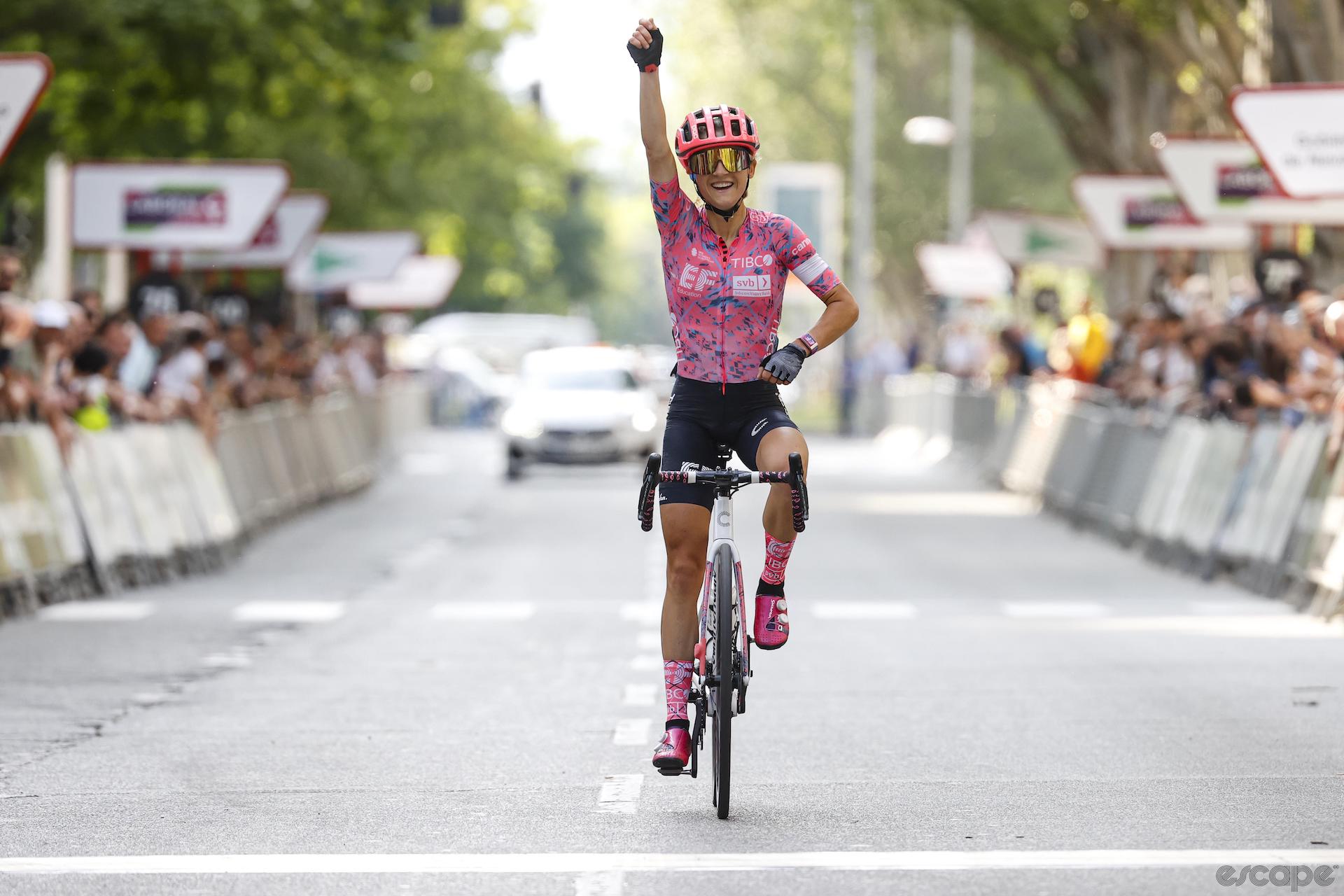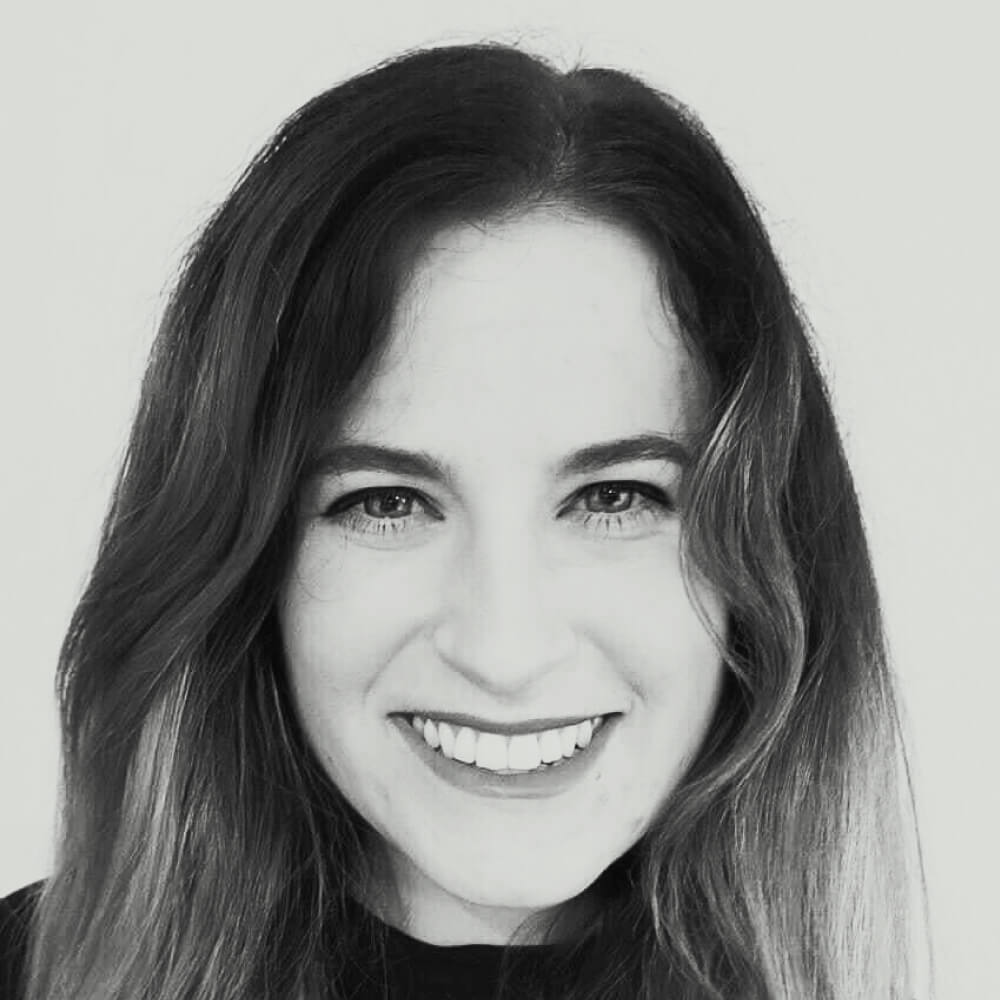The conventional wisdom is that it takes years to learn how to race a bike, decades to perfect tactical nuance, and season after season of experience to find comfort while hurtling along narrow European roads with dozens of riders all fighting for the same position.
How densely can that education be compressed? In just two seasons, Veronica Ewers, an amateur just a few years ago, has tested the limits of what’s possible. Last year, less than 12 months after her first European race, she rode to a top ten overall at the Tour de France Femmes avec Zwift. She has the engine, of that there is no doubt. The next step in her development, she thinks, has more to do with the mental than physical side of the sport.
“I have definitely had moments where I’ve been in a race and needed to work on certain areas,” Ewers said in an interview with Escape Collective. “In Strade Bianche [this year] positioning for key moments…knowing the courses is incredibly important and an advantage.”

There are aspects of Ewers’s rapid rise to become one of the best Americans in the WorldTour that are not unique in the women’s peloton, a group rife with doctors and lawyers and PhDs, latecomers with aerobic talents who must quickly find their way. But Ewers’s openness to learn and grow as an athlete, her fresh take on professional cycling, and how she got to where she is now, is a story all her own.
What’s also unique about Ewers is that after only one full season of racing in Europe, she finds herself in a leadership role on a European team. There have been many Americans before her who came to bike racing late, perhaps from another sport, and have found success racing on the road. Few of them made it to Europe to race on a professional team against the best in the world, and fewer yet were able to achieve the results Ewers has in such a short amount of time.
Just five years ago it wasn’t all that uncommon for someone as strong as Ewers but with limited experience to lead a team, even in a prestigious race like the Giro Donne. But the European women’s peloton has evolved dramatically in just the past few years, a shift that accelerated just as Ewers entered the sport. The salaries are higher, which frees female pros to train more hours. And top teams in particular have access to better coaching, equipment, and sports science resources. As a result, every year the fields are faster, deeper, and more competitive. As that collective experience grows, leadership opportunities are given to the most experienced riders.
So how exactly did Ewers find herself leading one of the top women’s teams in the world in the biggest stage race of 2022, barely a year into her European career?
It all started when, like many athletes before her, Ewers found herself adrift when her career as a college soccer player ended.
“I had that sort of athlete crisis that I think a lot of people deal with of, ‘What am I doing now?’ Because so much of my identity was around being a student-athlete,” Ewers explained. “And then once that was over, I kind of had to figure out how to fill that void.”
What she missed, aside from the structure and goal-oriented life of a collegiate athlete, was the community. At first, she tried to fill the void with a combination of running and Olympic lifting. She wasn’t trying to accomplish anything, and there were no clear goals in her future; she was just trying out a new pair of shoes.
After graduating from Willamette University, Ewers moved from Salem, Oregon to Seattle, Washington and joined a local running club, but she still didn’t feel like she’d found the community she was missing.
“I was still running a lot and part of that running community, but didn’t really feel like I was necessarily part of a team, or didn’t really feel like I had much of a community still,” Ewers said. “Seattle’s pretty cold in the way people are at times, so it’s really hard to find that network of people.”
As a kid in Moscow, Idaho, Ewers would ride her bike to and from school. In a small town that was just what you did, but nothing changed when she was living in Seattle. She would still ride her slightly neglected Kona Jake the Snake cyclocross bike to and from work at the Seattle Children’s Hospital.
One day a friend invited her to go on a “meet the team” ride for a local Seattle bike shop called Métier.
“Not really knowing what I was getting into I said yes, just to support her because she was nervous to go by herself,” Ewers said. “And of course I showed up on my Kona with flat pedals and tennis shoes, wearing leggings and a sweatshirt and everyone else was fully kitted out on really nice bikes.”
It’s safe to say when Ewers showed up for a “meet the team” ride, not even for a team she was part of, she had no way of knowing where that road would lead her. On her flat pedals, in her tennis shoes, Ewers easily kept pace with the rest of the group. It’s worth noting that this first ride was in 2018, only a few years before Ewers would sign a professional contract and pack her bags to race the first ever women’s Paris-Roubaix.
“I ended up meeting Jennifer Wheeler and David Richter, who I guess saw something in me,” Ewers said. “They were pretty surprised that I was still able to hang on with what I showed up wearing and using.”
Wheeler and Richter ended up creating their own team, Fount Cycling Guild. “Jennifer reached out to me pretty persistently after that ride saying that they were going to start this new team and that she wanted to develop a strong women’s team and wanted me to be a part of it.”
Ewers eventually joined the team. She didn’t think much of it. Her first race was in February of 2019, by which point she’d left her Kona behind and was on a decent bike.
It wasn’t necessarily racing that piqued Ewers’s interest; she didn’t even know cycling was a professional sport at that point. It was the hunt for a community that inspired Ewers to join the team. But like so many before and after her, Ewers fell in love with cycling and all that comes with it.
“I met a lot of really, really incredible people in Seattle,” she said. “I was still working a 40-hour work week at Seattle Children’s Hospital, but I fell 110% into cycling. I was able to fulfil that social need through the community in cycling and I still keep in touch with a lot of people from that team.”
It wasn’t long before Ewers was racing at the top level in the USA, but unfortunately, she came into the sport just as the pandemic was gutting the American racing scene. In 202,1 Ewers raced her first national championships, as a privateer, where she finished third in the road race behind her future teammate Lauren Stephens and Team DSM’s Coryn Labecki (now racing for Jumbo-Visma). The American Tibco-SVB team took notice and immediately signed Ewers to race the Joe Martin Stage Race that August. She finished second overall.
From there, after barely two years of racing and only two top-level US races, Ewers flew to Europe to race Tour Cycliste Féminin de l’Ardèche, a week-long stage race in France (where she again paced the team with a fifth-place finish overall). Then, in rapid-fire fashion, came Paris-Roubaix Femmes, the Women’s Tour, and Ronde van Drenthe.
“I was so nervous,” Ewers said of racing the inaugural Paris-Roubaix. “I like to say I participated in Paris Roubaix. I did not really race it, but it was an absolutely incredible experience.”
At the end of the year, Tibco-SVB turned into EF Education-TIBCO-SVB. They picked up a WorldTour license and signed Ewers through 2025.
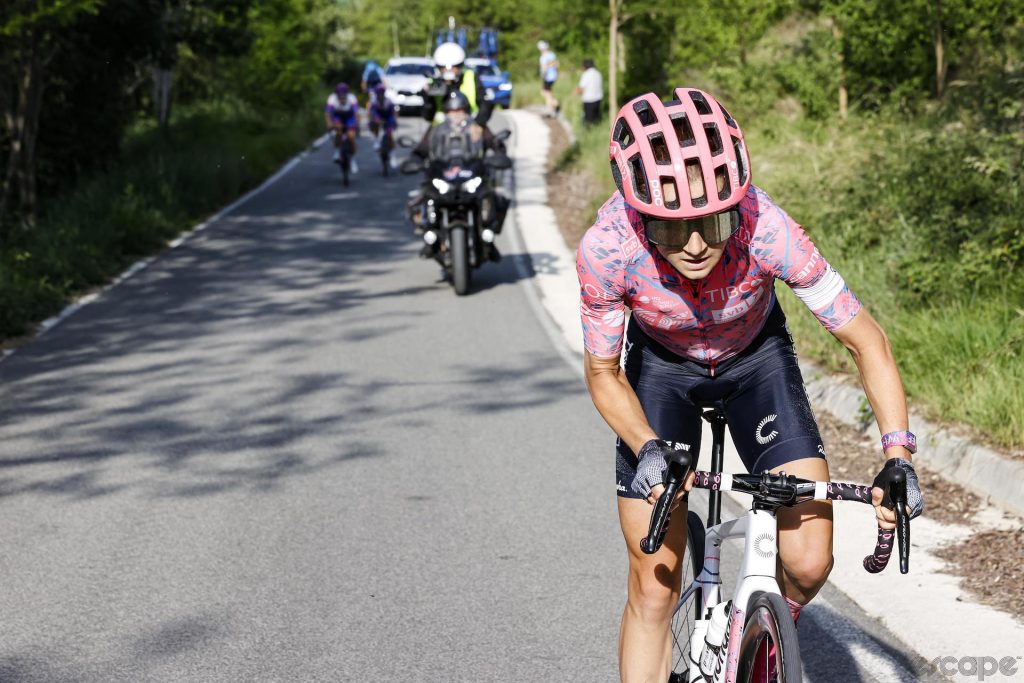
By then Ewers not only knew about professional cycling, but she’d also found inspiration watching the women race.
“Strade was the first race that I watched and I was in awe of how badass the women were,” Ewers said. “But even viewing it, I never saw myself getting to that level. It was motivating to see really strong women out there.”
It didn’t take long for Ewers to take her first win on European soil, soloing to victory after a late-race move in the second stage of the 2022 Ceratizit Elsy Jacobs. Days later, she won the Navarra Women’s Classic solo in Spain ahead of Ane Santesteban and Kristen Faulkner. A few podium finishes later Ewers found herself at the most highly anticipated women’s race in years, the inaugural Tour de France Femmes avec Zwift. By then she knew enough about the racing scene to understand the significance of the situation. Her parents even flew over to follow the race.
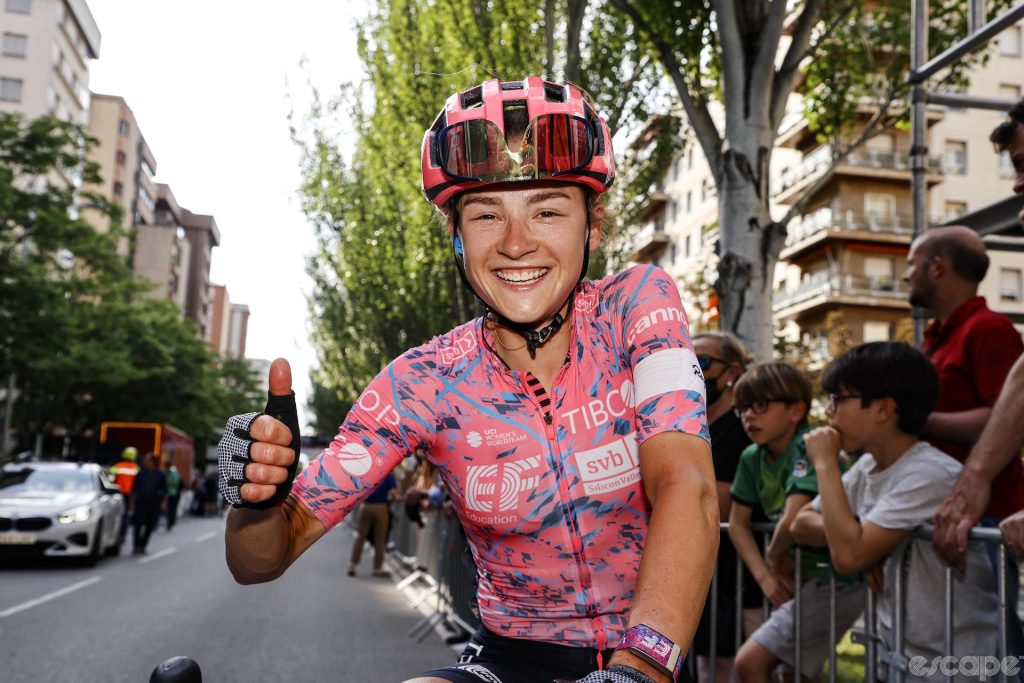
She ended up finishing ninth overall. But it wasn’t her pure strength that got her there. There’s no denying Ewers has something special when it comes to athletic ability, but one does not finish ninth at the biggest stage race of the year, in a field of 144 riders all keenly aware of the stakes, on fitness alone. Riding in the bunch, a skill that comes as second nature to a lot of the European peloton, was something Ewers had to learn the hard way.
“It’s just a lot of racing as much as I can, getting as much experience as I can. Fortunately, the team and the directors specifically pick races that are primarily for me to just gain experience with no pressure.”

“It’s funny, I used to be absolute shit at descending” Ewers laughed, recalling that someone was recently complimenting her descending skills. “Getting dropped on the descent in races after working so hard on the climbs, that’s just so demoralizing. And I think just experiencing that and not wanting that to happen again made me push my comfort zone.”
As her technical skills begin to match her aerobic athletic gifts, the mental side of the sport is what Ewers finds herself grappling with in her second full season as a professional.
“I find myself getting overwhelmed or giving in to fear sometimes, which makes me hesitate. And then I find myself at the back of the bunch. I think for me it’s been much more of a mental challenge, than a physical challenge, navigating in the bunch because I think ultimately I know where I need to be and what I need to do. But it’s the nerves of filling a gap in the bunch when we’re going however fast.”
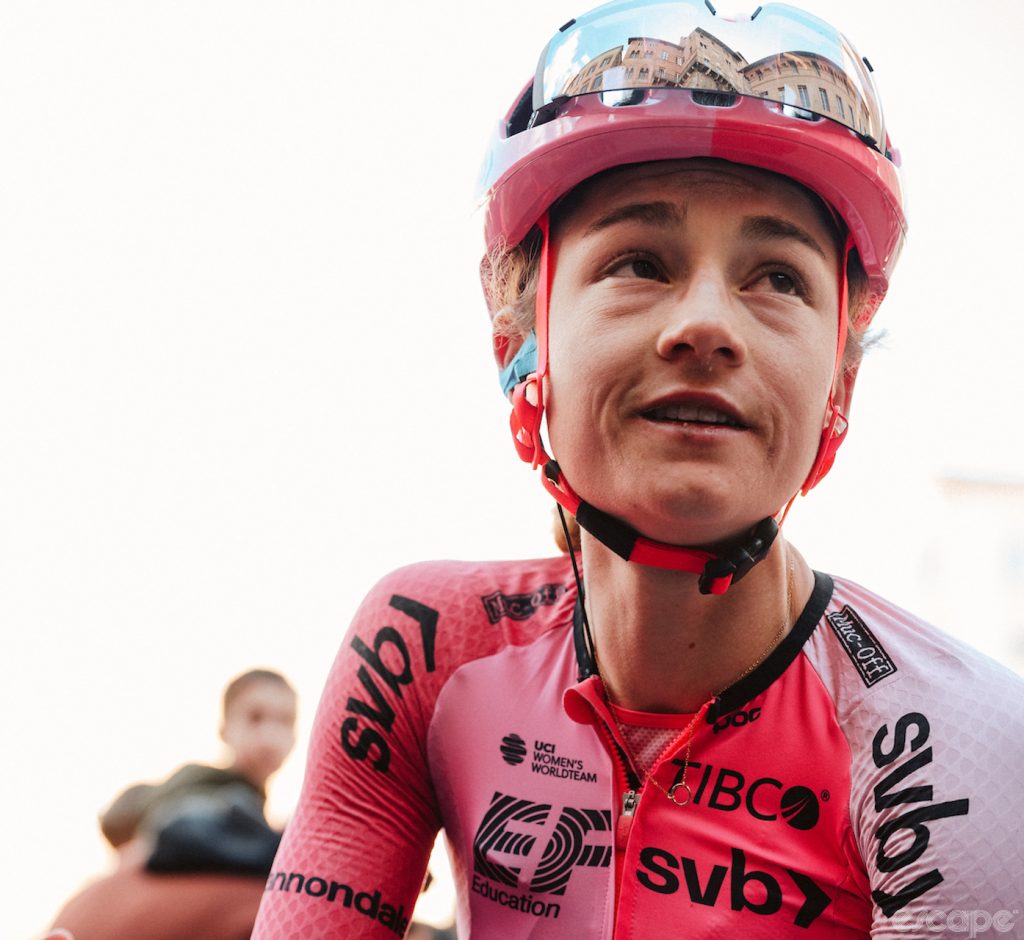
On top of figuring out the intricacies of riding in a peloton moving at unnerving speed, Ewers has had to come to terms with the pressure of coming ninth at the Tour de France Femmes and winning races. Which makes sense. She signed with TIBCO-SVB as a brand new rider, with very little experience, but within a year she became one of the team’s leaders.
“Having had a successful first year last year I am coming into this season with a lot of expectations of myself. I guess you could say there is a part of me that fears failure,” Ewers wrote on Instagram before she boarded a flight to Europe for the 2023 season.
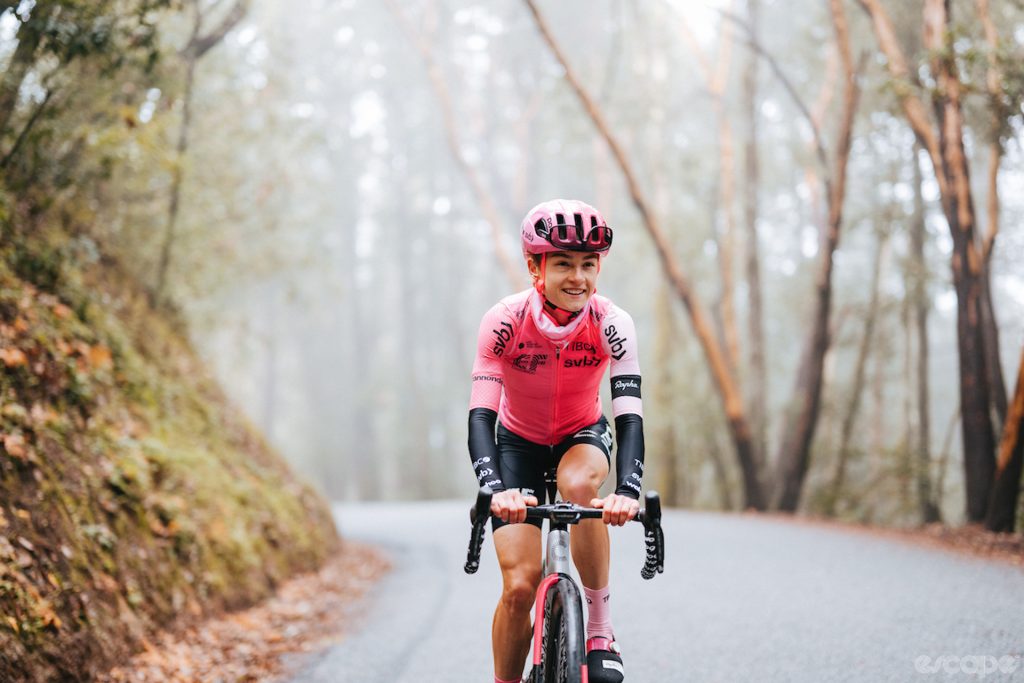
“I would say I’m still working through it a bit,” Ewers said a few months after she opened up on Instagram. “I know that the majority of the pressure is coming from myself. There is pressure from the team to some extent, but they are good at balancing when there are races that I need to be focused on and feel that pressure and races that are no expectations.”
“The team know and understands that I still am learning but I also have this ability at times to be a race leader. They’re really good at balancing that. On the flip side, I have a lot of expectations for myself, which aren’t necessarily always fair.”
The mental side of the sport, Ewers says, is the largest part, and working with a sports psychologist is important.
“I’m so glad that it’s become more normalized and not just in sports. I think it’s becoming more normalized in general,” Ewers said of going to therapy. I joke around with one of my good friends back home, if there’s a guy that’s in therapy, I’m super into that because it means that they’re working on their emotions and they’re working on their own personal being, and that makes them a better partner.”
The same goes for working on yourself as a cyclist, as a teammate, and as an athlete.
For their second year in the WorldTour EF Education-TIBCO-SVB has added some more WorldTour experience to the roster. Ewers says that Alison Jackson, a Canadian who has ridden for teams like Liv Xstra and Team DSM, and former New Zealand national champion Georgia Williams, who spent most of her career with the Jayco-AlUla outfit, have made a big impact on the team already.
“It’s been really awesome this year, seeing where our team is going. It’s still a pretty similar team to last year, but having the likes of Alison and Georgia coming on, it’s making our team a lot stronger,” Ewers said. “[They] help us be more cohesive.”

As for the future, Ewers has settled into her new home in Girona, Spain, a small city that has become home to many professionals and amateurs alike. She’s in this at least until 2025, but hopefully longer, and she has her sights set on Paris.
“I am really excited to tap into the untapped potential that I have,” Ewers said of her future in the sport. “I’ve heard from so many people that it takes about three to five years for a cyclist to really get into their groove in the sport. Next year will be my third year so hopefully, we’ll see how it goes in that way.”
“I want to see where this goes and of course, the Olympics next year are a goal.”
For someone who had only ever watched pieces of the Tour de France when she was a kid, and who admittedly didn’t even enjoy cycling, Ewers has come a long way in a very short time.
“I never, ever would have thought I would be here,” she admitted. “I honestly used to hate riding a bike as a kid. Mostly, I will blame my parents on this one because they would always want to go on bike rides on Mother’s or Father’s Day. They had road bikes and I was on a mountain bike and of course, I was going to be miserable trying to follow them. But I ended up full circle coming back to it and falling in love with it.”
After kicking off her 2023 season in Spain Ewers went to Italy to race Strade Bianche, the first race she ever watched.
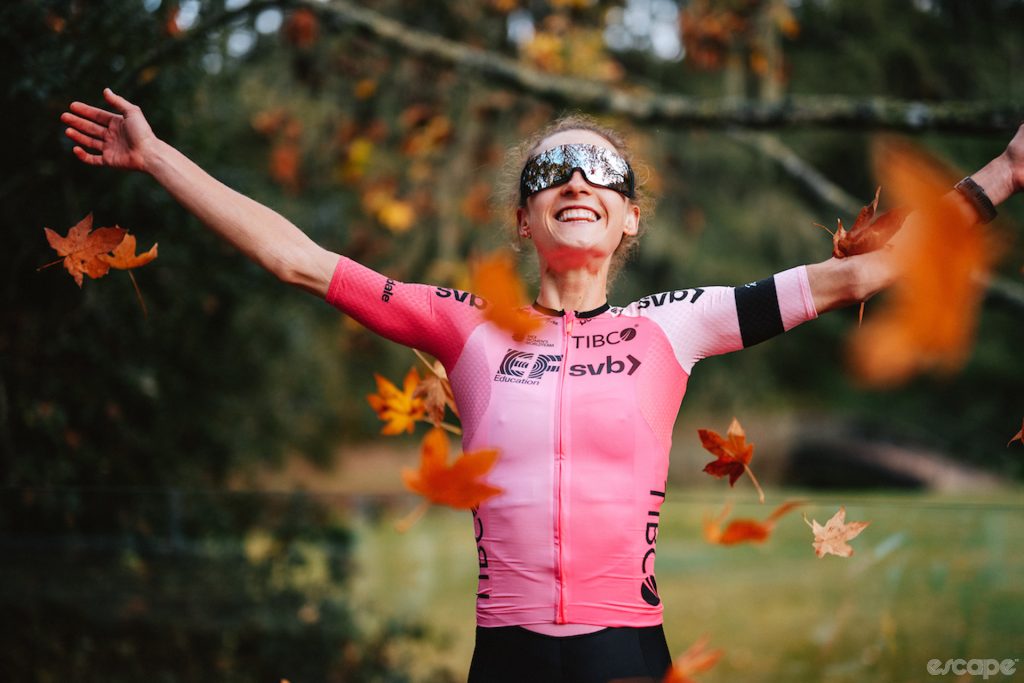
“It’s just like a Belgian classic in the sense that there are so many key moments that you need to be in the right position at the right time,” Ewers said. “Now, having been through the race, I know how important those key moments are. Learning the courses and further developing cohesiveness within the team I think is just really exciting.”
Ewers now has just over one full year of European racing under her tyres, and she noted she’s signed with EF Education-Tibco-SVB through 2025. That’s a remarkable amount of contract stability in a sport known for one-year deals. But, she said, “I don’t necessarily have long, long plans.” She’s just focused on figuring out the next step on a learning curve she’s climbing as fast as she can ride up a mountain. With seasoned teammates guiding the way and a whole lot of belief in her abilities, long-term plans aren’t really necessary for the Idaho native; she plans to get where she’s going a whole lot quicker.
What did you think of this story?
